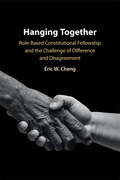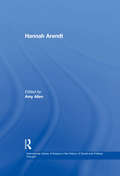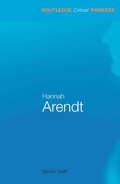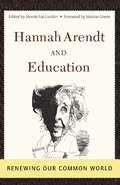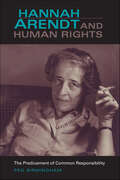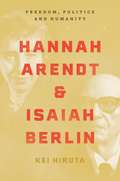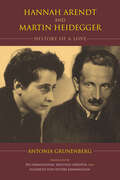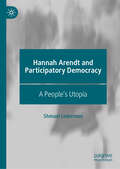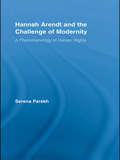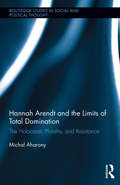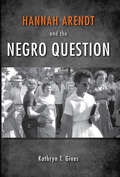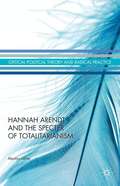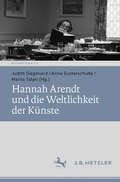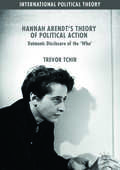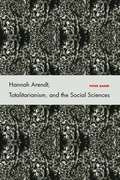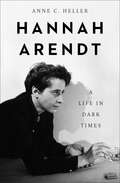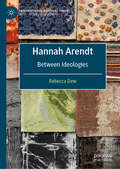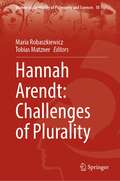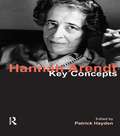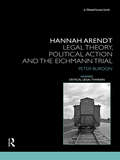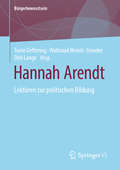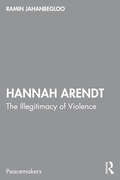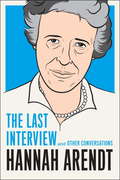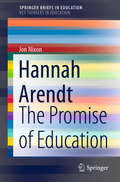- Table View
- List View
Hanging Together: Role-Based Constitutional Fellowship and the Challenge of Difference and Disagreement
by Eric W. ChengDifference and disagreement can be valuable, yet they can also spiral out of control and damage liberal democracy. Advancing a metaphor of citizenship that the author terms 'role-based constitutional fellowship,' this book offers a solution to this challenge. Cheng argues that a series of 'divisions of labor' among citizens, differently situated, can help cultivate the foundational trust required to harness the benefits of disagreement and difference while preventing them from 'overheating' and, in turn, from leaving liberal democracy vulnerable to the growing influence of autocratic political forces. The book recognizes, however, that it is not always appropriate to attempt to cultivate trust, and acknowledges the important role that some forms of confrontation might play in identifying and rectifying undue social hierarchies, such as racial-ethnic hierarchies. Hanging Together thereby works to pave a middle way between deliberative and realist conceptions of democracy.
Hannah Arendt (International Library of Essays in the History of Social and Political Thought)
by Amy AllenHannah Arendt was one of the most original and influential social and political theorists of the 20th century. This volume brings together the most important English-language essays of the past 30 years on Arendt's unique and lasting contributions to social and political philosophy.
Hannah Arendt (Routledge Critical Thinkers)
by Simon SwiftHannah Arendt's work offers a powerful critical engagement with the cultural and philosophical crises of mid-twentieth-century Europe. Her idea of the banality of evil, made famous after her report on the trial of the Nazi war criminal, Adolf Eichmann, remains controversial to this day. In the face of 9/11 and the 'war on terror', Arendt's work on the politics of freedom and the rights of man in a democratic state are especially relevant. Her impassioned plea for the creation of a public sphere through free, critical thinking and dialogue provides a significant resource for contemporary thought. Covering her key ideas from The Origins of Totalitarianism and The Human Condition as well as some of her less well-known texts, and focussing in detail on Arendt's idea of storytelling, this guide brings Arendt's work into the twenty-first century while helping students to understand its urgent relevance for the contemporary world.
Hannah Arendt And Education
by Mordechai GordonHannah Arendt And Education: Renewing Our Common World is the first book to bring together a collection of essays on Hannah Arendt and education. The contributors contend that Arendt offers a unique perspective, one which enhances the liberal and critical traditions' call for transforming education so that it can foster the values of democratic citizenship and social justice. They focus on a wide array of Arendtian concepts--such as natality, action, freedom, public space, authority and judgment--which are particularly relevant for education in a democratic society. Teachers, educators, and citizens in general who are interested in democratic or civic education would benefit from reading this book.
Hannah Arendt and Education: Renewing our Common World
by Mordechai Gordon"Hannah Arendt And Education: Renewing Our Common Worlda"is the first book to bring together a collection of essays on Hannah Arendt and education. The contributors contend that Arendt offers a unique perspective, one which enhances the liberal and critical traditions'' call for transforming education so that it can foster the values of democratic citizenship and social justice. They focus on a wide array of Arendtian conceptsOCosuch as natality, action, freedom, public space, authority and judgmentOCowhich are particularly relevant for education in a democratic society. Teachers, educators, and citizens in general who are interested in democratic or civic education would benefit from reading this book. "
Hannah Arendt and Human Rights: The Predicament of Common Responsibility (Studies in Continental Thought)
by Peg BirminghamHannah Arendt's most important contribution to political thought may be her well-known and often-cited notion of the "right to have rights." In this incisive and wide-ranging book, Peg Birmingham explores the theoretical and social foundations of Arendt's philosophy on human rights. Devoting special consideration to questions and issues surrounding Arendt's ideas of common humanity, human responsibility, and natality, Birmingham formulates a more complex view of how these basic concepts support Arendt's theory of human rights. Birmingham considers Arendt's key philosophical works along with her literary writings, especially those on Walter Benjamin and Franz Kafka, to reveal the extent of Arendt's commitment to humanity even as violence, horror, and pessimism overtook Europe during World War II and its aftermath. This current and lively book makes a significant contribution to philosophy, political science, and European intellectual history.
Hannah Arendt and Isaiah Berlin: Freedom, Politics and Humanity
by Kei HirutaFor the first time, the full story of the conflict between two of the twentieth century’s most important thinkers—and how their profound disagreements continue to offer important lessons for political theory and philosophyTwo of the most iconic thinkers of the twentieth century, Hannah Arendt (1906–1975) and Isaiah Berlin (1909–1997) fundamentally disagreed on central issues in politics, history and philosophy. In spite of their overlapping lives and experiences as Jewish émigré intellectuals, Berlin disliked Arendt intensely, saying that she represented “everything that I detest most,” while Arendt met Berlin’s hostility with indifference and suspicion. Written in a lively style, and filled with drama, tragedy and passion, Hannah Arendt and Isaiah Berlin tells, for the first time, the full story of the fraught relationship between these towering figures, and shows how their profoundly different views continue to offer important lessons for political thought today.Drawing on a wealth of new archival material, Kei Hiruta traces the Arendt–Berlin conflict, from their first meeting in wartime New York through their widening intellectual chasm during the 1950s, the controversy over Arendt’s 1963 book Eichmann in Jerusalem, their final missed opportunity to engage with each other at a 1967 conference and Berlin’s continuing animosity toward Arendt after her death. Hiruta blends political philosophy and intellectual history to examine key issues that simultaneously connected and divided Arendt and Berlin, including the nature of totalitarianism, evil and the Holocaust, human agency and moral responsibility, Zionism, American democracy, British imperialism and the Hungarian Revolution. But, most of all, Arendt and Berlin disagreed over a question that goes to the heart of the human condition: what does it mean to be free?
Hannah Arendt and Martin Heidegger: History of a Love (Studies in Continental Thought)
by Antonia Grunenberg Elizabeth von Witzke BirminghamA biographical account of two major thinkers of the twentieth century, a relationship marked as much by estrangement and distance as reunion and friendship.How could Hannah Arendt, a German Jew who fled Germany in 1931, have reconciled with Martin Heidegger, whom she knew had joined and actively participated in the Nazi Party? In this remarkable biography, Antonia Grunenberg tells how the relationship between Arendt and Heidegger embraced both love and thought and made their passions inseparable, both philosophically and romantically. Grunenberg recounts how the history between Arendt and Heidegger is entwined with the history of the twentieth century with its breaks, catastrophes, and crises. Against the violent backdrop of the last century, she details their complicated and often fissured relationship as well as their intense commitments to thinking.“Focuses on a relationship that began when Arendt was a student in the 1920s, was broken between 1933 and 45, and resumed after the war.” —The Chronicle of Higher Education
Hannah Arendt and Participatory Democracy: A People's Utopia
by Shmuel LedermanThis book centers on a relatively neglected theme in the scholarly literature on Hannah Arendt's political thought: her support for a new form of government in which citizen councils would replace contemporary representative democracy and allow citizens to participate directly in decision-making in the public sphere.The main argument of the book is that the council system, or more broadly the vision of participatory democracy was far more important to Arendt than is commonly understood. Seeking to demonstrate the close links between the council system Arendt advocated and other major themes in her work, the book focuses particularly on her critique of the nation-state and her call for a new international order in which human dignity and “the right to have rights” will be guaranteed; her conception of “the political” and the conditions that can make this experience possible; the relationship between philosophy and politics; and the challenge of political judgement in the modern world.
Hannah Arendt and the Challenge of Modernity: A Phenomenology of Human Rights
by Serena ParekhHannah Arendt and the Challenge of Modernity explores the theme of human rights in the work of Hannah Arendt. Parekh argues that Arendt's contribution to this debate has been largely ignored because she does not speak in the same terms as contemporary theoreticians of human rights. Beginning by examining Arendt’s critique of human rights, and the concept of "a right to have rights" with which she contrasts the traditional understanding of human rights, Parekh goes on to analyze some of the tensions and paradoxes within the modern conception of human rights that Arendt brings to light, arguing that Arendt’s perspective must be understood as phenomenological and grounded in a notion of intersubjectivity that she develops in her readings of Kant and Socrates.
Hannah Arendt and the Limits of Total Domination: The Holocaust, Plurality, and Resistance (Routledge Studies in Social and Political Thought)
by Michal AharonyResponding to the increasingly influential role of Hannah Arendt’s political philosophy in recent years, Hannah Arendt and the Limits of Total Domination: The Holocaust, Plurality, and Resistance, critically engages with Arendt’s understanding of totalitarianism. According to Arendt, the main goal of totalitarianism was total domination; namely, the virtual eradication of human legality, morality, individuality, and plurality. This attempt, in her view, was most fully realized in the concentration camps, which served as the major "laboratories" for the regime. While Arendt focused on the perpetrators’ logic and drive, Michal Aharony examines the perspectives and experiences of the victims and their ability to resist such an experiment. The first book-length study to juxtapose Arendt’s concept of total domination with actual testimonies of Holocaust survivors, this book calls for methodological pluralism and the integration of the voices and narratives of the actors in the construction of political concepts and theoretical systems. To achieve this, Aharony engages with both well-known and non-canonical intellectuals and writers who survived Auschwitz and Buchenwald concentration camps. Additionally, she analyzes the oral testimonies of survivors who are largely unknown, drawing from interviews conducted in Israel and in the U.S., as well as from videotaped interviews from archives around the world. Revealing various manifestations of unarmed resistance in the camps, this study demonstrates the persistence of morality and free agency even under the most extreme and de-humanizing conditions, while cautiously suggesting that absolute domination is never as absolute as it claims or wishes to be. Scholars of political philosophy, political science, history, and Holocaust studies will find this an original and compelling book.
Hannah Arendt and the Negro Question
by Kathryn T. GinesWhile acknowledging Hannah Arendt's keen philosophical and political insights, Kathryn T. Gines claims that there are some problematic assertions and oversights regarding Arendt's treatment of the "Negro question." Gines focuses on Arendt's reaction to the desegregation of Little Rock schools, to laws making mixed marriages illegal, and to the growing civil rights movement in the south. Reading them alongside Arendt's writings on revolution, the human condition, violence, and responses to the Eichmann war crimes trial, Gines provides a systematic analysis of anti-black racism in Arendt's work.
Hannah Arendt and the Specter of Totalitarianism
by Marilyn LafayThis work positions Arendt as a political writer attempting to find a way in which humanity, poised between the Holocaust and the atom bomb, might reclaim its position as the creators of a world fit for human habitation.
Hannah Arendt und die Weltlichkeit der Künste (Ästhetiken X.0 – Zeitgenössische Konturen ästhetischen Denkens)
by Anne Eusterschulte Judith Siegmund Marita TatariHannah Arendt hat kein spezifisch kunstphilosophisches Buch geschrieben. Jedoch spielen ihre Überlegungen zu den Künsten und mehr noch die kulturgeschichtliche Verortung von produktions- und rezeptionsästhetischen Fragen eine wichtige Rolle in ihrem Werk. Der Band legt den Fokus auf kunstphilosophische Konzepte und Reflexionen in den Texten Arendts und bringt diese sowohl mit ihrer politischen Theorie als auch mit aktuellen Fragen künstlerischer Praxis in Zusammenhang. Entsprechend werden zentrale Aspekte von Arendts kunstrelevanter Begrifflichkeit thematisiert: So etwa das künstlerische „Herstellen“, das ästhetische „Urteilen“, die „Dingheit“ und „Verdinglichung“ der Kunstwerke und damit einhergehend die „weltliche“ und „zwischenmenschliche“ Dimension ihrer Gegenständlichkeit. Aus der Perspektive dieser Überlegungen zu Kunst und Künsten werden nicht nur Arendts Verständnis des Öffentlichen und des Privaten neu diskutiert, sondern ebenso ihre Konzepte von „Dauerhaftigkeit“, „Sprachlichkeit“, „Wahrhaftigkeit“ und „Geschichtlichkeit“. Vor diesem Hintergrund wird schließlich auch nach dem Verhältnis der unterschiedlichen Künste im Hinblick auf ihre konstitutive Weltlichkeit gefragt.
Hannah Arendt's Theory of Political Action
by Trevor TchirThis book presents an account of Hannah Arendt's performative and non-sovereign theory of freedom and political action, with special focus on action's disclosure of the unique 'who' of each agent. It aims to illuminate Arendt's critique of sovereign rule, totalitarianism, and world-alienation, her defense of a distinct political sphere for engaged citizen action and judgment, her conception of the 'right to have rights,' and her rejection of teleological philosophies of history. Arendt proposes that in modern, pluralistic, secular public spheres, no one metaphysical or religious idea can authoritatively validate political actions or opinions absolutely. At the same time, she sees action and thinking as revealing an inescapable existential illusion of a divine element in human beings, a notion represented well by the 'daimon' metaphor that appears in Arendt's own work and in key works by Plato, Heidegger, Jaspers, and Kant, with which she engages. While providing a post-metaphysical theory of action and judgment, Arendt performs the fact that many of the legitimating concepts of contemporary secular politics retain a residual vocabulary of transcendence. This book will be of interest not only to Arendt scholars, but also to students of identity politics, the critique of sovereignty, international political theory, political theology, and the philosophy of history.
Hannah Arendt, Totalitarianism, and the Social Sciences
by Peter BaehrBaehr (social theory, Lingman U. , Hong Kong) critically reviews the debates between Hannah Arendt and her critics in the social sciences over her theory of totalitarianism and her critique of social science as being fundamentally unable to account for totalitarianism. Specifically, he examines the encounters between: Arendt and David Riesman over the limits of totalitarianism, Arendt and Raymond Aron over his idea that totalitarianism could be explained as an amplification of revolutionary ideology and violence, and Arendt and Jules Monnerot about the nature of "political religion. " He also addresses some of the theoretical implications of these debates for thinking about Islamic fundamentalism. Annotation ©2010 Book News, Inc. , Portland, OR (booknews. com)
Hannah Arendt: A Life in Dark Times
by Anne C HellerThe acclaimed biographer presents &“a perceptive life of the controversial political philosopher&” and author of Eichmann in Jerusalem (Kirkus Reviews). Hannah Arendt was a polarizing cultural theorist—extolled by her peers as a visionary and berated by her critics as a poseur and a fraud. Born in Prussia to assimilated Jewish parents, she escaped from Hitler&’s Germany in 1933. Arendt is now best remembered for the storm of controversy that surrounded her 1963 New Yorker series on the trial of Adolf Eichmann, a kidnapped Nazi war criminal. Arendt&’s first book, The Origins of Totalitarianism, single-handedly altered the way generations around the world viewed fascism and genocide. Her most famous work, Eichmann in Jerusalem, created fierce debate that continues to this day, exacerbated by the posthumous discovery that she had been the lover of the philosopher and Nazi sympathizer Martin Heidegger. In this comprehensive biography, Anne C. Heller tracks the source of Arendt&’s contradictions and achievements to her sense of being a &“conscious pariah&”—one of those rare people who doesn&’t &“lose confidence in ourselves if society does not approve us&” and will not &“pay any price&” to gain the acceptance of others.
Hannah Arendt: Between Ideologies (International Political Theory)
by Rebecca DewThis book presents an incisive survey of twentieth-century transatlantic ideational exchange. The author argues that German-American political thinker Hannah Arendt is to be distinguished not only from the French side of the existentialist movement, but singled out from Heidegger on the German side, as well. The primary feature of Arendt’s existentialism is its practicality in political terms; its acknowledgment of the vital need for viable public spaces of vocalization, action and interaction; its recommendation of councils, constitutions and other structural foundations for the visible presentation of politics; and the applicability of her view of political action to her estimation of authentic human living. Drawing from the work of Karl Jaspers as her primary exemplar, conclusions are made as to the degree to which Arendt’s existentialism, thereby identified as atypical, is to be assessed as postmodern without going so far as to declare her intellectual bent postmodernist.
Hannah Arendt: Challenges of Plurality (Women in the History of Philosophy and Sciences #10)
by Maria Robaszkiewicz Tobias MatznerThis volume explores challenges posed by plurality, as understood by Hannah Arendt, but also the opportunities it offers. It is an interdisciplinary collection of chapters, including contributions from different traditions of philosophy, political science, and history. The book offers novel perspectives on central issues in research on Arendt, reconfiguring the existing interpretations and reinforcing the line of interpretation illuminating the phenomenological facets of Arendt’s theory. The authors of the contributions to this volume decisively put the notion of plurality in the center of the collected interpretations, pointing out that plurality in its dialectic form of commonality, and difference is not only, as assumed by default, one of the most important notions in Arendt’s theory, but the very central one. At the same time, plurality is a central issue in many current debates, from populism and hate speech to migration and privacy. This collection therefore connects the theoretical advancements regarding Arendt and other political thinkers with some of the most pressing contemporary issues. This book will be of interest to scholars and advanced students from philosophy, political theory and related fields studying contemporary challenges of plurality as well as scholars interested in the work of Hannah Arendt.
Hannah Arendt: Key Concepts (Key Concepts)
by Patrick HaydenHannah Arendt is one of the most prominent thinkers of modern times, whose profound influence extends across philosophy, politics, law, history, international relations, sociology, and literature. Presenting new and powerful ways to think about human freedom and responsibility, Arendt's work has provoked intense debate and controversy. 'Hannah Arendt: Key Concepts' explores the central ideas of Arendt's thought, such as freedom, action, power, judgement, evil, forgiveness and the social. Bringing together an international team of contributors, the essays provide lucid accounts of Arendt's fundamental themes and their ethical and political implications. The specific concepts Arendt deployed to make sense of the human condition, the phenomena of political violence, terror and totalitarianism, and the prospects of sustaining a shared public world are all examined. 'Hannah Arendt: Key Concepts' consolidates the disparate strands of Arendt's thought to provide an accessible and essential guide for anybody who wishes to gain a deeper understanding of this leading intellectual figure.
Hannah Arendt: Legal Theory and the Eichmann Trial (Nomikoi: Critical Legal Thinkers)
by Peter BurdonHannah Arendt is one of the great outsiders of twentieth-century political philosophy. After reporting on the trial of Nazi war criminal Adolf Eichmann, Arendt embarked on a series of reflections about how to make judgments and exercise responsibility without recourse to existing law, especially when existing law is judged as immoral. This book uses Hannah Arendt’s text Eichmann in Jerusalem to examine major themes in legal theory, including the nature of law, legal authority, the duty of citizens, the nexus between morality and law and political action.
Hannah Arendt: Lektüren zur politischen Bildung (Bürgerbewusstsein)
by Dirk Lange Tonio Oeftering Waltraud Meints-StenderHannah Arendts Philosophie des Politischen ist in der zweiten Hälfte des 20. Jahrhunderts zum Klassiker avanciert. Ihr emphatischer Begriff des Politischen wird in der Sozialphilosophie und in der politischen Theorie kontrovers debattiert. In jüngster Vergangenheit ist auch in der politischen Bildung eine deutliche Zunahme der Arendt Rezeption zu verzeichnen, in der auf ganz unterschiedliche Weise auf ihre Schriften Bezug genommen wird. Die Autorinnen und Autoren dieses Bandes nehmen dies zum Anlass, bildungspolitische Zugänge und Lektüren von Hannah Arendts Schriften zu präsentieren, um damit ihren grundlagentheoretischen Beitrag zur politischen Bildung zu erfassen.Mit Beiträgen von Fred Dewey, Jerome Kohn, Wolfgang Heuer, Ingo Juchler, Dirk Lange, Bettina Lösch, Helgard Mahrdt, Waltraud Meints-Stender, Ingeborg Nordmann, Tonio Oeftering und Elisabeth Young-Bruehl
Hannah Arendt: The Illegitimacy of Violence (Peacemakers)
by Ramin JahanbeglooThis book presents an original understanding of Arendt in the context of comparative political theory. The author discusses Arendt’s acute and perceptive view of violence as well as practical applications of her thought in a comparative context.The book examines Hannah Arendt’s ideas about politics and violence provoked by the horrors of totalitarianism. It applies the rich potential of Arendt’s insights to the wider cultural context and discourse of nonviolence. Through case studies of India and Iran, it presents a new way of reading Arendt’s understanding and critique of violence beyond the simple analysis of her work on power and violence.An original, nuanced and meaningful guide to Hannah Arendt, the book will be essential reading for students and scholars in politics, philosophy and peace and conflict studies.
Hannah Arendt: The Last Interview
by Hannah ArendtArendt was one of the most important thinkers of her time, famous for her idea of "the banality of evil" which continues to provoke debate. This collection provides new and startling insight into Arendt's thoughts about Watergate and the nature of American politics, about totalitarianism and history, and her own experiences as an émigré.Hannah Arendt: The Last Interview and Other Conversations is an extraordinary portrait of one of the twentieth century's boldest and most original thinkers. As well as Arendt's last interview with French journalist Roger Errera, the volume features an important interview from the early 60s with German journalist Gunter Gaus, in which the two discuss Arendt's childhood and herescape from Europe, and a conversation with acclaimed historian of the Nazi period, Joachim Fest, as well as other exchanges.These interviews show Arendt in vigorous intellectual form, taking up the issues of her day with energy and wit. She offers comments on the nature of American politics, on Watergate and the Pentagon Papers, on Israel; remembers her youth and her early experience of anti-Semitism, and then the swift rise of the Hitler; debates questions of state power and discusses her own processes of thinking and writing. Hers is an intelligence that never rests, that demands always of her interlocutors, and her readers, that they think critically. As she puts it in her last interview, just six months before her death at the age of 69, "there are no dangerous thoughts, for the simple reason that thinking itself is such a dangerous enterprise."
Hannah Arendt: The Promise of Education (SpringerBriefs in Education)
by Jon NixonThis book gathers some of Hannah Arendt’s core themes and focuses them on the question, ‘What is education for?’ For Arendt, as for Aristotle, education is the means whereby we achieve personal autonomy through the exercise of independent judgement, attain adulthood through the recognition of others as equal but different, gain a sense of citizenship through the assumption of our civic rights and responsibilities, and realize our full potential as sentient beings with the capacity for human ‘flourishing’ and ‘happiness’ (eudaimonia). In order to appreciate the pivotal role that education plays in Arendt’s analysis of the human condition, we have to understand the emphasis she placed on ‘thoughtfulness’, as the measure of our humanity and on ‘thoughtlessness’, as the measure of our inhumanity. Education sustains and develops the human capacity: to think together (phronesis), to think for oneself (what Arendt called ‘the two-in-one’ of thinking), and to think from the point of view of others (what she termed ‘representative thinking’). From the developing constellation of ideas embedded in her vast and varied body of work, the author infers a notion of education as a necessary preparation for personal fulfillment, social engagement, and civic participation.
